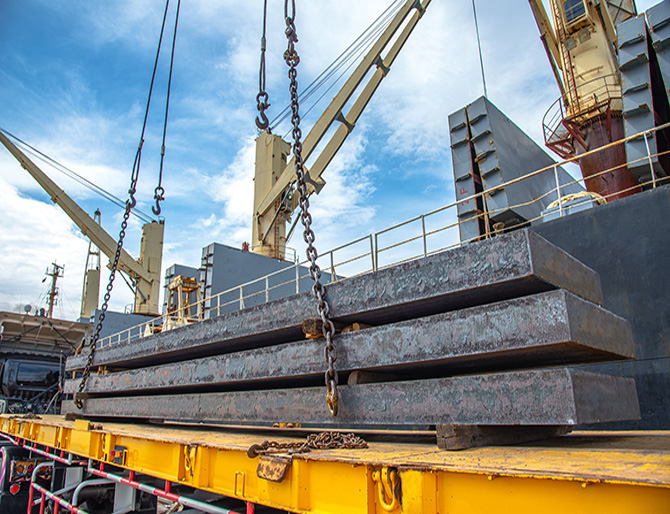-
-
GIFT City, Gandhinagar, Gujarat - India


Logistics
Let us take the stress out of your move
We recognize that the logistics and fulfillment aspect presents the most significant challenge in establishing and streamlining trade in metals, minerals, and capital goods. Leveraging our extensive experience and expertise in Metal Logistics and Supply Chain Management, combined with our deep understanding of the latest technological advancements, we are committed to establishing a world-class Logistics and Fulfillment SBU that aligns with our vision.
This strategic unit will serve as a catalyst, seamlessly connecting all operations and elevating the overall user experience. In the context of the steel industry, logistics refers to the management and coordination of various activities involved in the transportation, storage, and distribution of steel products throughout the supply chain. It encompasses the planning, execution, and control of the movement of raw materials, intermediate products, and finished steel products from their point of origin to their final destination.
Logistics in the steel industry plays a crucial role in ensuring the smooth flow of materials and products, optimizing operational efficiency, and meeting customer demands. By effectively managing logistics, steel companies can enhance their competitiveness, reduce costs, improve customer satisfaction, and optimize their overall operations. Efficient logistics practices contribute to the smooth functioning of the steel supply chain, from raw material procurement to the delivery of finished steel products.
Material Handling & Transportation

Transportation in the steel industry refers to the movement of raw materials, semi-finished products, and finished steel products between different locations within the industry's supply chain. It plays a crucial role in ensuring the smooth flow of materials and products throughout the steel production and distribution processes.
The transportation of steel typically involves various modes of transportation, including trucks, trains, ships, and sometimes airplanes, depending on the distance and the specific requirements of the industry. It may include bulk shipping, rail transportation, trucking, or a combination of these methods. Factors such as cost, distance, volume, and urgency influence the selection of transportation modes.
Warehousing & Distributions
Warehousing refers to the storage and management of steel products in a dedicated facility known as a warehouse. Warehousing plays a crucial role in the steel industry as it allows for the efficient handling, organization, and distribution of steel products.
Warehouses must have adequate space, appropriate handling equipment, and proper inventory management systems to ensure efficient storage, retrieval, and tracking of steel products. Essential for efficient storage, inventory management, quality control, and order fulfillment of steel products. It ensures that steel is readily available, well-maintained, and delivered to customers in a timely manner, contributing to the smooth functioning of the steel supply chain.

Vendor Registration

The purpose of vendor registration is to streamline the procurement process and ensure transparency, efficiency, and accountability.
It helps prevent fraudulent activities, promotes healthy competition, and enhances the overall quality of goods and services procured by an organization.
